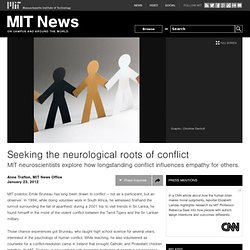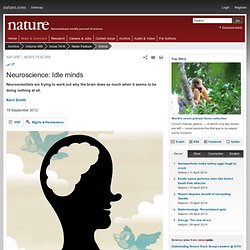

Cognitive Neuroscience. Seeking the neurological roots of conflict. MIT postdoc Emile Bruneau has long been drawn to conflict — not as a participant, but an observer.

In 1994, while doing volunteer work in South Africa, he witnessed firsthand the turmoil surrounding the fall of apartheid; during a 2001 trip to visit friends in Sri Lanka, he found himself in the midst of the violent conflict between the Tamil Tigers and the Sri Lankan military. Those chance experiences got Bruneau, who taught high school science for several years, interested in the psychology of human conflict. While teaching, he also volunteered as counselor for a conflict-resolution camp in Ireland that brought Catholic and Protestant children together. At MIT, Bruneau is now working with associate professor of cognitive neuroscience Rebecca Saxe to figure out why empathy — the ability to feel compassion for another person’s suffering — often fails between members of opposing conflict groups. Political views 'hard-wired' into your brain. Low IQ & Conservative Beliefs Linked to Prejudice.
There's no gentle way to put it: People who give in to racism and prejudice may simply be dumb, according to a new study that is bound to stir public controversy.

The research finds that children with low intelligence are more likely to hold prejudiced attitudes as adults. These findings point to a vicious cycle, according to lead researcher Gordon Hodson, a psychologist at Brock University in Ontario. Low-intelligence adults tend to gravitate toward socially conservative ideologies, the study found. Those ideologies, in turn, stress hierarchy and resistance to change, attitudes that can contribute to prejudice, Hodson wrote in an email to LiveScience. "Prejudice is extremely complex and multifaceted, making it critical that any factors contributing to bias are uncovered and understood," he said. Controversy ahead The findings combine three hot-button topics. Brains and bias As suspected, low intelligence in childhood corresponded with racism in adulthood. A study of averages.
On the evolutionary origins of the egalitarian syndrome. Sergey Gavrilets1 Author Affiliations Edited by Peter J.

Richerson, University of California, Davis, CA, and accepted by the Editorial Board July 2, 2012 (received for review January 30, 2012) Abstract The evolutionary emergence of the egalitarian syndrome is one of the most intriguing unsolved puzzles related to the origins of modern humans. Footnotes Author contributions: S.G. designed research, performed research, analyzed data, and wrote the paper. The Compassionate Instinct. Humans are selfish.

It’s so easy to say. The same goes for so many assertions that follow. Greed is good. Altruism is an illusion. Cooperation is for suckers. These kinds of claims reflect age-old assumptions about emotion. Jonathan Payne Even compassion, the concern we feel for another being’s welfare, has been treated with downright derision. Neuroscience: Idle minds. For volunteers, a brain-scanning experiment can be pretty demanding.

Researchers generally ask participants to do something — solve mathematics problems, search a scene for faces or think about their favoured political leaders — while their brains are being imaged. But over the past few years, some researchers have been adding a bit of down time to their study protocols. While subjects are still lying in the functional magnetic resonance imaging (fMRI) scanners, the researchers ask them to try to empty their minds.
The aim is to find out what happens when the brain simply idles. And the answer is: quite a lot. Some circuits must remain active; they control automatic functions such as breathing and heart rate. Resting-state activity is important, if the amount of energy devoted to it is any indication. But what is all this activity for? Always active A set of experiments in the mid-1990s first suggested that the brain never really takes a break. Nature Podcast Disordered thinking.